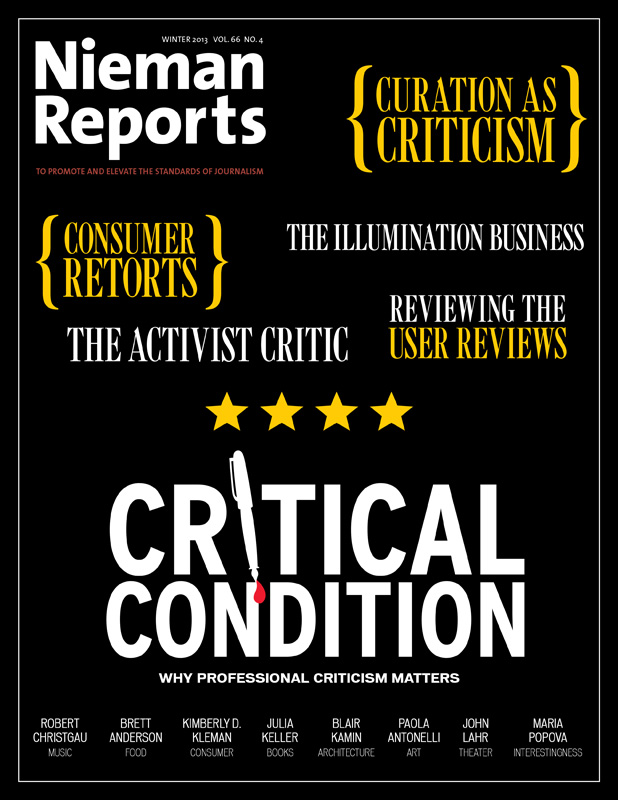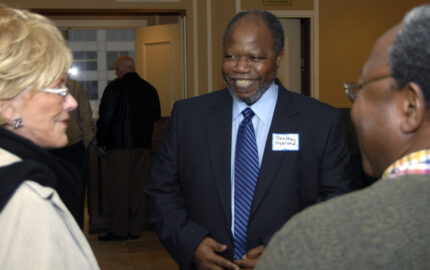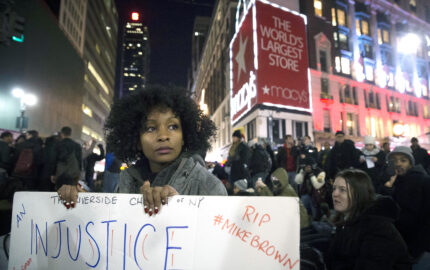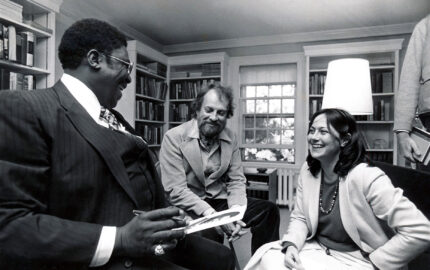1962
 Sebastiaan Kleu, a South African editor and economist, died of heart failure on October 11th. He was 85.
Sebastiaan Kleu, a South African editor and economist, died of heart failure on October 11th. He was 85.Kleu began his career in journalism on the editorial board of the Afrikaans-language newspaper Die Burger, where he later served as economics editor until 1961. Kleu became the third Nieman Fellow from South Africa, following Lewis Nkosi and Aubrey Sussens in the class of 1961. During his fellowship he studied economics, and he completed a doctorate in economics at Harvard Business School in 1966. He later was a part-time professor at Randse Afrikaanse Universiteit (now the University of Johannesburg).
"The opportunity that Nieman provided him with, and his exposure to Harvard University undoubtedly had a lasting impression on my father," his son, Sebastiaan Kleu, Jr., wrote in an e-mail. "To this day the walls of my father's study at home are adorned with various photos and mementos of Harvard and related experiences (e.g., the Harvard library, Harvard Business School) as well as his time as lecturer at Boston University while he was completing his doctorate at Harvard."
After returning to South Africa he became a member of the Board of Trade and Industries, serving as its chairman from 1970 to 1986. He also was chairman of the Productivity Advisory Council, a member of the Hotel Council, and chairman of the working group assigned by the minister of economic affairs to create an industrial strategy for South Africa. From 1986 to 1991, he was an economic adviser at the South African Reserve Bank.
He is survived by his second wife, Annie, and three children. His first wife, Cynthia, died in 1996.
*
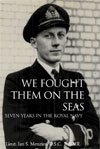 Ian Menzies self-published a memoir, "We Fought Them on the Seas: Seven Years in the Royal Navy," in December.
Ian Menzies self-published a memoir, "We Fought Them on the Seas: Seven Years in the Royal Navy," in December.In 1939, Menzies, a rookie reporter for The (Glasgow) Herald in Scotland, was called up by the Royal Navy to serve in World War II. Over the next seven years he traveled across the Atlantic and Mediterranean, serving on five ships. During the D-Day invasion of Normandy, he was executive officer on the American-built destroyer H.M.S. Stayner; he received the Distinguished Service Cross for his service on the ship.
The Stayner is also responsible for bringing him to America. He first came to the United States in 1943 to take command of the ship in Hingham, Massachusetts, and while there met his future wife, Barbara, whom he married after the war. They settled in the Boston area, and Menzies went on to work at The Boston Globe for 37 years, including time as managing editor and urban affairs columnist.
1963
Read Scates's obituary at seattelpi.com.
 Shelby Scates, a reporter and columnist who covered politics for the Seattle Post-Intelligencer for more than 25 years, died at a hospice near his home in West Seattle, Washington of complications from dementia on January 3rd. He was 81.
Shelby Scates, a reporter and columnist who covered politics for the Seattle Post-Intelligencer for more than 25 years, died at a hospice near his home in West Seattle, Washington of complications from dementia on January 3rd. He was 81.With a three-day-a-week column and reporting from Olympia, D.C., Air Force One, and abroad, Scates was a prominent figure in Washington State politics and journalism. He championed a number of state politicians who went on to national prominence, including senators Dan Evans and Slade Gordon.
In his 2000 book, "War and Politics by Other Means: A Journalist's Memoir," Scates offered his prescription for what makes a good reporter: "It is a complicated mix of curiosity and zeal of the hunt based on a will to try to do good for the less powerful in our democratic society by keeping them informed of the forces that would do them ill. The good reporter has a calling, not a profession, and conducts himself within the severest strictures of fairness and factual accuracy. Otherwise, he is a stenographer or, worse, a propagandist."
One of the most unusual scoops of his career came in 1979 when state Representative Bob Perry, who had fled the country after being implicated in a corruption scandal 18 months earlier, called and asked Scates to meet him at an airstrip in Canada so he could confess and surrender. Scates agreed and delivered the fugitive politician across the border to the custody of U.S. marshals at a federal courthouse in Seattle. Recounting the story in his memoir, he writes that Perry chose him because he "trusted my ability to report his confession … . He needed a good newspaper as well as a good reporter for what he was about to do."
Born in rural Tennessee, Scates traveled across the country in his late teens. He settled in Seattle in 1951, working as a merchant seaman to pay his way through the University of Washington. After graduating in 1954 he spent two years in the Army before taking a job in Dallas with International News Service. He later worked for United Press International and The Associated Press in Louisiana and Oklahoma and for Seattle's weekly Argus before joining the Hearst-owned Post-Intelligencer in the late 1960s.
In addition to his memoir, he wrote two other books, "Warren G. Magnuson and the Shaping of Twentieth-Century America," about a former senator from Washington, and "Maurice Rosenblatt and the Fall of Joseph McCarthy," about the founder of the National Committee for an Effective Congress and his role in the overthrow of Senator Joseph McCarthy.
In addition to his political reporting, Scates took occasional foreign assignments for Hearst Newspapers. In 1967, he covered the Six-Day War in Israel and in 1984 he reported on Cambodian guerillas fighting against the Vietnamese army.
Perhaps the most daring of his international assignments was traveling to the Pakistan-China border in 1978 to cover the first American ascent of K2, the world's second highest mountain at 28,250 feet. Seattle mountaineer Jim Whittaker, the expedition leader, invited Scates, an avid but amateur climber, to cover the attempt (with Hearst paying a fee for the newspaper rights). Scates climbed with the team to a camp at 18,500 feet. As he writes in his memoir, he used a radio borrowed from the U.S. Army to relay dispatches to a woman in the nearby town of Skardu, who then transmitted them by telegraph to Islamabad, where they were given to the local UPI office and sent on to Hearst's offices in New York. He called the relay system "the world's most hastily wrought, overextended, and remote wire service."
"The really funny thing about it," he continued, "is that it worked."
He is survived by his longtime partner Joan Hansen, two daughters, and two granddaughters.
1967
Hiranmay Karlekar's "Endgame in Afghanistan: For Whom the Dice Rolls" was published by SAGE in October.
The book covers a number of topics related to the war in Afghanistan, especially the planned withdrawal of U.S. troops and the role that Pakistan will play in the country's future.
Karlekar, a veteran Indian journalist, writes a column for The Pioneer, an English-language daily newspaper based in New Delhi. He has previously served as editor of the Hindustan Times, and in other positions at the Indian Express, the Statesman, and the Hindustan Standard.
*
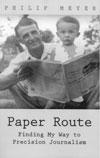 Philip Meyer has self-published a memoir about the newspaper part of his career, "Paper Route: Finding My Way to Precision Journalism."
Philip Meyer has self-published a memoir about the newspaper part of his career, "Paper Route: Finding My Way to Precision Journalism."The story describes his progression from childhood during the Great Depression in rural and small-town Kansas to a series of newspaper jobs and a life-changing epiphany that occurred early in his Nieman year.
A course designed to provide Harvard sophomores with research skills for their senior theses introduced him to computer-based statistical analysis. While listening to a lecture by assistant professor Chad Gordon, he realized that he could do more than just report on social science. He could use its fast-evolving tools in his own work, covering the political and social movements of the turbulent 1960s.
One result was "Precision Journalism," published in 1973 (and still in print in its 2002 fourth edition). Meyer credits Edwin A. Lahey, NF '39, a legendary member of the first class of Nieman Fellows, with nudging him in the right direction. And he credits the informal contacts enabled by Harvard as proving to be as important as the classes.
The story is placed in the context of major historical events of the 20th century, including the two World Wars (his father was a combat infantryman in the first), the Depression, the Korean conflict, and the civil rights movement. The account ends with his transition to a second career, university teaching and research, in 1981. Now professor emeritus, Meyer formerly held the Knight Chair in Journalism at University of North Carolina-Chapel Hill.
In reviewing the book in Journalism & Mass Communication Quarterly, Edward C. Pease wrote, "It is fascinating to watch Meyer's slow growth from the grad student who avoided statistics into one of the nation's top experts in the use of the scientific method in journalism.
"We know how this story comes out, of course, so there's not much suspense, but it's interesting to watch as the idea takes hold. At [The Miami] Herald, he says, 'We had discussed the possibility of reporting on some interesting social phenomenon. We always ended with a shrug and a lament that there was no way to measure it.' "
Now, thanks to the Harvard-inspired methods, sometimes there is a way.
*
Read Whelan's obituary in The New York Times.James R. Whelan, the founding editor and publisher of The Washington Times, died at his home in Miami on December 1st of multiple organ failure. He was 79.
Founded in 1982 as a conservative alternative to The Washington Post, the Times was published by News World Communications, the media arm of the Rev. Sun Myung Moon's South Korea-based Unification Church.
Despite initial misgivings about the possible influence of the church, Whelan took the job with a promise of independence from News World president Bo Hi Pak. All the same, his staff included many members of the church as well as former staffers of The Washington Star, which had ceased publication the previous year.
In a "Statement of Principles" published on the front page of the first edition, Whelan wrote that the paper would "be a truthful newspaper, conscious always of the principle that our planet is and ought to be governed ultimately according to the wishes of Almighty God, the Supreme Authority. But The Washington Times will represent the interests of no one religion, any more than it will close its mind or pages to any moral man or cause."
Two years later Whelan was fired, claiming afterward that the paper's editorial independence had been comprised. By that time its circulation was up to 100,000 and it had won the support of President Ronald Reagan, who was known to read the Times daily.
Whelan's career in journalism began in his hometown of Buffalo, when he dropped out of the University of Buffalo to become a copy boy at the Buffalo Courier-Express. He later went to work for United Press International, serving as a correspondent in Buffalo, Providence and Boston, and as a foreign correspondent in Buenos Aires, Argentina and Caracas, Venezuela. He covered the sinking of the Andrea Doria cruise liner in 1956 and the Bay of Pigs invasion in 1961.
In the 1960s, he was an editor at the Miami News and the Sacramento Union, then returned to Latin America for the Scripps-Howard Newspaper Alliance in the 1970s. He finished his bachelor's degree at Florida International University in Miami in 1975.
After his ouster from the Times, he served as managing director of news for the Christian Broadcasting Network before returning to Latin America to report for the Latin American News service and teach at the University of Chile. He wrote several books about Latin America, including "Out of the Ashes: Life, Death and the Transfiguration of Democracy in Chile, 1833-1988" and "Allende: Death of a Marxist Dream."
He is survived by a son, a daughter, and four grandchildren.
1968
 Jerome Aumente developed and conducted a two-week educational trip for Jordanian journalists to observe the U.S. presidential election in October and November.
Jerome Aumente developed and conducted a two-week educational trip for Jordanian journalists to observe the U.S. presidential election in October and November.The program was organized by Meridian International Center in Washington, D.C., and the journalists were in the country as guests of the U.S. State Department.
Aumente is distinguished professor emeritus and special counselor to the dean at the Rutgers School of Communication and Information.
1976
 Guenter Haaf retired from Wort & Bild publishing house in October 2011. He had been its editorial director since 2003, overseeing the staffs of seven health magazines with a combined circulation of 16 million.
Guenter Haaf retired from Wort & Bild publishing house in October 2011. He had been its editorial director since 2003, overseeing the staffs of seven health magazines with a combined circulation of 16 million.Haaf started in journalism in 1965, when he was an apprentice editor for the German edition of Mickey Mouse magazine. He went on to work in the layout department of Hobby magazine, and began writing freelance articles on science and technology. He was the science editor at Stern from 1971 to 1975, then of Die Zeit from 1977 to 1986. He then led three magazines as editor in chief: GEO Wissen beginning in 1986, Natur in 1993, and Gesundheit in 1998.
After his Nieman Fellowship, Haaf stayed in the U.S. for another year as a Harkness Fellow. He traveled to 46 states ("the remaining I've visited since then," he adds) and worked as an intern for Technology Review, Science, Scientific American, and Newsweek.
He offered the following update in an e-mail to Nieman Reports: "Since retirement I'm enjoying very much a life without deadline pressure and editorial conferences and fights over editorial budgets. Having written several books and zillions of articles, now I rather like to go mountain hiking whenever possible in the nearby Alps (just 50 kilometers south of my home in Pöcking on Lake Starnberg, south of Munich), always carrying my Canon EOS camera. And I like visiting all those wonderful museums and concert halls and picturesque towns between Budapest and Paris, Milan and Berlin. And I'm glad to finally have enough time to meet good old friends, among them quite a few Niemans."
1977
John Painter, who retired from The Oregonian in 2002 after a 40-year reporting career covering a multitude of beats, has written a memoir. "The title is, 'If Your Mother Says She Loves You, Check It Out,'?" he wrote in an e-mail. "Now, I'm looking for a New York agent who, hopefully, can get it published."
Painter, then 18, started at the Portland daily in 1958 as a copyboy and night police reporter. He joined the Army after graduating from the University of Oregon and wound up in Virginia working for the Richmond Times-Dispatch after he got out. Following a bad car accident, he returned to Oregon and got a job as a copy editor for his old paper.
He was soon reassigned as a reporter and went on to cover practically every beat in the newsroom. He wrote about city and county government, state and local police agencies, and courts at all levels.
During the 1973 oil embargo, he traveled to Texas, California, Alaska and Canada to report on energy issues. He also worked as an investigative reporter, editorial writer, suburban reporter, and as the lead writer for the Sunday Forum section. At the time of his retirement, he worked in the Vancouver bureau.
*
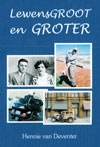 Hennie van Deventer has published his 17th book, "Lewensgroot en Groter," ("Large as Life and Larger") which he says will be his last.
Hennie van Deventer has published his 17th book, "Lewensgroot en Groter," ("Large as Life and Larger") which he says will be his last.The former executive at Cape Town, South Africa's Naspers newspaper company has written 15 books since his retirement in 1997, covering a wide range of topics and styles. He had previously written two books while working as a journalist. He sent the following update in an e-mail to Nieman Reports:
"My books are in my home language, Afrikaans. The titles will not be revealing to English speakers outside my home country. One exception is Mayafudi, a story about a fictional elephant, which has been translated into English. This little book has also evolved in my first e-book on Amazon—but in Afrikaans.
"I have written several books about newspapers—autobiographical but also newspaper humor. I love stories about people. At least three books describe colorful characters I came to know. I have also written about man's best friend—an anthology of newspaper stories about dogs.
"[Wife] Tokkie and I alternate between Melkbos, a seaside village near Cape Town, and Sabiepark, a private bush reserve, next to the Kruger National Park, where I bought a cottage on retirement. Five of my books (one a 'photo album') reveal my love for the bush and all that live there.
"I retain two blogspots: www.hennievandeventer.com/hvdblog and blogs.litnet.co.za/hvandeventer—both in Afrikaans, I fear."
1986
Carmen Fields became associate director for national programs at the DentaQuest Foundation in October 2011. The Boston-based foundation works to improve and support oral health in underserved and uninsured populations across the United States.
Fields is a former assistant city editor at The Boston Globe, where she was part of the team that won the 1975 Pulitzer Prize for Public Service for coverage of school desegregation.
*
Geneva Overholser will step down as director of the University of Southern California's Annenberg School of Journalism when her five-year term ends in June.
During her tenure, the school added 12 faculty members and expanded its partnerships with outside organizations to give students real world experience. It is also beginning construction on a building that will include a 20,000-square-foot digital newsroom.
Before joining Annenberg, Overholser taught at the University of Missouri School of Journalism and had held positions at The Washington Post, The New York Times, and The Des Moines Register.
*
Frank Sotomayor was inducted into the Stanford University Multicultural Alumni Hall of Fame in 2011.
Sotomayor, who received a master's degree from Stanford in 1967, was recognized for career achievement as a journalist, mentor and advocate for diversity in the news media. He was an editor at the Los Angeles Times for 35 years, and was co-editor of the paper's "Latinos in Southern California" series, which won the 1984 Pulitzer Prize for Public Service. He is also a co-founder of the Robert C. Maynard Institute for Journalism Education, which provides training for young minority journalists.
Sotomayor is currently an adjunct faculty member at the University of Southern California and a senior fellow at the Institute for Journalism & Justice, which works to strengthen reporting on social justice issues.
1987
Songpol Kaopatumtip took early retirement from The Bangkok Post in Thailand this past July.
Kaopatumtip had worked for the English-language newspaper and its sister afternoon paper, The Bangkok World, for 36 years.
He started at the World as a proofreader in 1976, while in his second year studying mechanical engineering at King Mongkut's Institute of Technology in Bangkok. He also worked as a copy editor, then became assistant to the editorial page editor of the Post after the World closed in 1990.
In 1996, he became editor of Perspectives, the Sunday Post's 12-page section of commentary, features, profiles and investigative reports. The section was phased out in a 2008 redesign, and Kaopatumtip became the Post's investigative news editor, his final position before retirement.
*
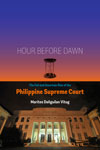 Marites Dañguilan Vitug's new book is "Hour Before Dawn: The Fall and Uncertain Rise of the Philippine Supreme Court," published in September by Cleverheads Publishing.
Marites Dañguilan Vitug's new book is "Hour Before Dawn: The Fall and Uncertain Rise of the Philippine Supreme Court," published in September by Cleverheads Publishing."Hour Before Dawn" is a follow-up to Vitug's 2010 book "Shadow of Doubt: Probing the Supreme Court," which examined the political motives and machinations of the Philippine Supreme Court.
In her new book, she writes that the threats and libel suits that followed the publication of "Shadow of Doubt" only further convinced her that she needed to continue telling the court's stories.
"I saw the intimidations as signs of discomfort of the powers that be and vested interests after a burst of sunshine suddenly brightened their dark corners," she writes. "But what was astonishing was the public's thirst for information on the Court since it had managed to preserve itself as the most secretive government institution for more than a hundred years."
A few months after she began her work on the book in June 2011, the court was thrown into upheaval by the impeachment of Chief Justice Renato Corona, who had been appointed two years earlier, for tax fraud. His trial and subsequent removal from office dominated the news cycle in the country, and quickly became the main focus of the book. Demand for information was so great, she writes, that in December 2011 she published some of her findings in a story for Rappler, the news website where she is an editor at large, about how Corona had been improperly awarded a degree by one of the country's most prestigious universities.
For the past decade Vitug was the editor of Newsbreak magazine, which merged with Rappler in January 2012.
She also is the president of the Journalism for Nation Building Foundation, an independent, nonprofit spinoff of Newsbreak that produces public interest work in books and special reports.
1988
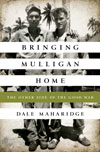 Dale Maharidge's new book, "Bringing Mulligan Home: The Other Side of the Good War," was published by PublicAffairs in March.
Dale Maharidge's new book, "Bringing Mulligan Home: The Other Side of the Good War," was published by PublicAffairs in March.Maharidge's father Steve fought in the Pacific as a Marine in World War II. He almost never spoke about the war, but his experiences occasionally surfaced throughout Maharidge's childhood as flashbacks and bouts of rage. One of the few mementos Maharidge's father kept was a photo, set at eye-level in his workshop, of himself and another Marine. When Steve died in 2000, Maharidge found more pictures, along with the other man's name: Herman Walter Mulligan.
Over the next 12 years, Maharidge tracked down as many people as he could who had served with his father, trying to find out what happened to Mulligan. They also were men who had rarely spoken of the war but now in their 70s and 80s they finally were willing to open up. Although the search for Mulligan was what inspired the project, Maharidge soon found that the real story was an ignored narrative of the war, one that ran counter to the widely accepted notion of it as "the good war."
In the introduction, Maharidge writes that the research helped him better understand his father and the wounds that caused his rage. What's more, he realized that this trauma was not unique to him or his war, as a new wave of veterans—and their children—would soon be discovering.
"As I was writing this book, a new generation of U.S. soldiers was returning home after brutal tours of duty in Iraq and Afghanistan, many with the trauma of wounds both physical and mental," he writes. "Their children will wonder why their mothers or fathers have rage or are depressed; those kids will face the puzzlement that I had as a boy. … I hope this book helps those kids learn about their parents and war and also bring home to them an understanding of what happens once the bullets and bombs stop flying—wars never end for the participants and their families."
Maharidge teaches journalism at the Columbia University Graduate School of Journalism. He is the author of several books, including six with photographer Michael Williamson. Their book "And Their Children After Them," a follow-up to James Agee and Walker Evans's "Let Us Now Praise Famous Men," won the 1990 Pulitzer Prize for Nonfiction.
1989
 Cynthia Tucker received the 2012 David Nyhan Prize for Political Journalism from Harvard University's Joan Shorenstein Center on the Press, Politics and Public Policy in November.
Cynthia Tucker received the 2012 David Nyhan Prize for Political Journalism from Harvard University's Joan Shorenstein Center on the Press, Politics and Public Policy in November."Cynthia Tucker's style is direct and strong," said Shorenstein Center director Alex S. Jones, NF '82, in presenting the award. "She tells you what she thinks, and what she thinks is always in support of the little guy, the fellow that David Nyhan always championed. But she is hardly a down-the-line liberal, spouting predictable views."
The annual Nyhan Prize, established after the death in 2005 of Boston Globe columnist and reporter David Nyhan, honors political journalists. Past winners include syndicated columnist Molly Ivins and Washington Post reporter Dana Priest.
Tucker spent more than 20 years as a columnist, editorial writer, and editorial page editor at The Atlanta Journal-Constitution, where she was awarded the 2007 Pulitzer Prize for Commentary, before becoming its Washington-based political columnist in 2009. She left the paper in 2011 to take a position as visiting professor of journalism at the University of Georgia's Grady College of Journalism and Mass Communication but continues to write a syndicated political column.
Accepting the award, Tucker invoked a phrase that Nyhan used to describe his own work, calling it the ability to "shine a little flashlight on a dark corner." She also stressed the importance of providing clear, reasoned commentary, free from biases and stereotypes, as the racial makeup of the country changes.
1992
Marcus Brauchli became a vice president of The Washington Post Company at the beginning of 2013.
In this new role, he is working closely with CEO Donald Graham to evaluate new media opportunities. "It is raining start-ups and new-media projects and I'm in up to my neck, and Marcus and I are going to work on them together," Graham told The New York Times.
Brauchli had been the executive editor of The Washington Post from 2008 until he stepped down at the end of 2012. He was the first editor at the Post to oversee print and digital operations, and he helped the paper develop new publishing platforms. The Post won four Pulitzer prizes during his tenure and was a finalist for eight more.
In announcing the change of leadership, Post publisher Katharine Weymouth said, "Marcus has contributed immeasurably in the more than four years he has been at the helm of this newsroom. We have become known for our ability to create innovative digital products that allow our readers to engage in new ways with some of the best journalism in the world."
1996
David Bank is the editor and CEO of Impact IQ, a new website that provides data and analysis on impact investment.
Impact IQ, which was launched in early 2012, focuses on "crucial information that investors need to do their own next deal to deliver social and environmental impact along with financial returns," according to its website.
Bank was a reporter for the Wall Street Journal from 1996 until 2005, where he covered the technology beat from Silicon Valley. He later became vice president of Encore.org, a nonprofit that helps people transition into new jobs in the nonprofit sector.
1999
Sandra King's public television show "Due Process" won two Mid-Atlantic Emmy Awards in September.
The program, which addresses law and justice issues and airs weekly on New Jersey public television, won for best interview/discussion series and for best interview/discussion program/special for "Justice Breyer: On Democracy," a live interview with the U.S. Supreme Court Justice Stephen Breyer.
King, a longtime producer and director of documentaries about social justice, serves as writer, reporter and producer on the show. She co-hosts it with criminal defense attorney Raymond Brown. It is produced by Rutgers School of Law-Newark and the Edward J. Bloustein School of Planning and Public Policy.
2001
Ken Armstrong won second place in the 2012 Philip Meyer Journalism Awards for The Seattle Times series "Methadone and the Politics of Pain."
The series, co-written with investigative reporter Michael J. Berens, tracked deaths in Washington State caused by methadone, a cheap but dangerous pain medication that was being prescribed to Medicaid patients. After the series ran, the state passed a law instructing physicians to use methadone only as a last resort. The series won a 2012 Pulitzer Prize for Investigative Reporting, as well as a 2011 Investigative Reporters and Editors (IRE) Award.
The Meyer awards, which were announced by IRE in January, honor Philip Meyer, NF '67, by recognizing journalism that uses the social science research methods he pioneered in his 1973 book "Precision Journalism."
2005
 Rusudan Tsereteli became chief of Georgian TV Channel 9's Washington, D.C. bureau in June 2012.
Rusudan Tsereteli became chief of Georgian TV Channel 9's Washington, D.C. bureau in June 2012.In her new post, she covered the U.S. presidential election and reported on foreign policy under the Obama administration.
Prior to moving to D.C., Tsereteli had been a correspondent for Voice of America's Georgian service and developed the program, "Georgians in America."
2007
 Damakant Jayshi joined Panos South Asia (PSA) in November 2011. Three years before his appointment, he helped launch the English-language newspaper Republica in Nepal.
Damakant Jayshi joined Panos South Asia (PSA) in November 2011. Three years before his appointment, he helped launch the English-language newspaper Republica in Nepal.As the regional NGO's country representative for Nepal, Jayshi develops projects related to media, public health, environment, conflict and globalization. PSA works with and through the media.
"What is immensely satisfying is that this new responsibility has allowed me to be with the media here and abroad," he told Nieman Reports in an e-mail. He identifies subjects that need coverage, develops story ideas, invites applications from reporters and editors, and assigns stories to journalists, either giving a research stipend or offering a fellowship.
Training workshops with experts from the media and outside fields are organized for the journalists selected. They then fan out and do their reporting.
"We never interfere in their work," he wrote. "It is up to the reporter and editor concerned to approach the subject as they deem fit. We do not have control over the final product."
His current projects involve monitoring coverage of economic news in Nepal, increasing awareness among reporters and editors in South Asia about climate change, and enhancing the coverage of development-related news in Nepal amidst what he called "excessive devotion to political news."
2008
 Alicia Anstead is the new editor in chief of The Writer magazine, a monthly founded in 1887 by two Boston Globe reporters. Madavor Media, the new owner, moved the magazine back to Massachusetts from the Milwaukee area where it had been based for the past 12 years.
Alicia Anstead is the new editor in chief of The Writer magazine, a monthly founded in 1887 by two Boston Globe reporters. Madavor Media, the new owner, moved the magazine back to Massachusetts from the Milwaukee area where it had been based for the past 12 years.Anstead told Nieman Reports in an e-mail: "My job is to build strong content about the art and craft of writing, and I'm looking for extraordinary contributors who have their fingers on the pulse of writing topics (all genres, including journalism), who are connected to authors, who are authors, who teach writing and/or who have strong reporting skills. So if you are that person or know that person, here's the best place to contact me with story ideas: aanstead@writermag.com." Stories range in length from 500 to 2,000 words.
Anstead said she will continue to edit Inside Arts, the D.C.-based performing arts magazine she has been overseeing for 10 years; run the Harvard Arts Blog for the Office for the Arts at Harvard; and do some freelance writing of her own.
*
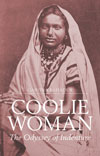 Gaiutra Bahadur's book, "Coolie Woman: The Odyssey of Indenture," will be published by the London-based Hurst in July. It is expected to be published in the United States by University of Chicago Press this fall.
Gaiutra Bahadur's book, "Coolie Woman: The Odyssey of Indenture," will be published by the London-based Hurst in July. It is expected to be published in the United States by University of Chicago Press this fall.In the book, Bahadur traces her great-grandmother's voyage from Calcutta to Guyana as an indentured servant, or "coolie," for a British sugarcane plantation in 1903. In doing so, she unearths the largely forgotten history of the nearly quarter-million women who left their homes for the new world in similar fashion.
Bahadur was a reporter with The Philadelphia Inquirer until she was laid off in 2007. Her freelance work has appeared in The New York Times, The Washington Post, and The Nation.
*
 Holly Williams has joined CBS News as a staff correspondent based in Turkey.
Holly Williams has joined CBS News as a staff correspondent based in Turkey.Williams had most recently been based in China as a correspondent for Sky News. She had previously reported from there for the BBC and CNN.
2009
 Haili Cao, who helped launch the pioneering Chinese business magazine Caijing and was most recently a reporter with Caixin Media in Beijing, is the managing editor of The New York Times's Chinese-language website, which launched in June 2012. Access to it (and the Times's English-language site) from inside mainland China has been blocked since the end of October. Cao wrote in an e-mail to Nieman Reports that the website had experienced substantial growth in traffic before access was blocked. The censorship followed publication of a story about wealth accumulated by the family of China's prime minister.
Haili Cao, who helped launch the pioneering Chinese business magazine Caijing and was most recently a reporter with Caixin Media in Beijing, is the managing editor of The New York Times's Chinese-language website, which launched in June 2012. Access to it (and the Times's English-language site) from inside mainland China has been blocked since the end of October. Cao wrote in an e-mail to Nieman Reports that the website had experienced substantial growth in traffic before access was blocked. The censorship followed publication of a story about wealth accumulated by the family of China's prime minister.*
 Guy Raz will be the host of "TED Radio Hour," a new weekly program co-produced by NPR and TED, beginning in March.
Guy Raz will be the host of "TED Radio Hour," a new weekly program co-produced by NPR and TED, beginning in March.The show draws on the archives of the TED Talk lecture series, which cover a wide range of ideas and topics (the name is an acronym for "Technology, Entertainment, Design"). The radio show was broadcast as a pilot project in several markets in early 2012. Raz, who was not involved in the pilot, says that he has long been a fan of the TED talks online and he's looking forward to adding what he calls "the NPR touch: creating compelling audio."
"It's an opportunity to create something brand new," he said. "The idea is to create a new way of talking about ideas. The hope is that every show will, in some way, change your way of looking at the world."
Raz had been the anchor of NPR's "Weekend All Things Considered" from 2009 until December, when he stepped down to work on the new show.
2010
 Monica Campbell is now the immigration editor and reporter for Public Radio International's "The World," co-produced with WGBH and the BBC World Service.
Monica Campbell is now the immigration editor and reporter for Public Radio International's "The World," co-produced with WGBH and the BBC World Service.In an e-mail to Nieman Reports, she wrote, "After more than 11 years away, I have circled back to California, to San Francisco, and here is where 'The World' means a perfect fit. The arrangement allows me to remain in California, home to the country's largest immigrant population, while also using my experience in Latin America—the flip side of the immigration story for so many people here—to inform coverage. I am also keen to bring in new voices on air, including journalists who are immigrants themselves and know the subjects at hand deeply. It is a gift to be with a news organization that values such coverage. Of course we see now, following the 2012 election, how immigration policy has returned to the priority list. I can't think of a better moment to deepen public understanding of the nuances at play.
"Stories range from how government policies affect everyday lives to how immigrants—from the newly arrived to first- and second-generation people—are shaping U.S. culture. I'm also helping to build a social media component to tap into new communities and engage immigrants themselves in discussions online and on-air."
*
Gary Knight co-published the photo book "Bosnia, 1992-1995" with two fellow photojournalists. All three covered the Bosnian war. Their goal with the book, which contains reportage and the work of more than 50 photographers from Bosnia and elsewhere, was to commemorate the 20th anniversary of the beginning of the war and re-engage with Bosnia.
Knight and co-publishers Jon Jones and Remy Ourdan raised $24,000 through a Kickstarter campaign and collected matching funds from other organizations.
"Some of that was just expedient," Knight wrote of the choice to self-publish in an e-mail to Nieman Reports. "We needed it done quickly to mark the anniversary of the beginning of the war, and also because we thought we knew best how it should look, what it should contain, etc. We wanted it printed in Bosnia so that our money would go into that economy, and we wanted it translated into Bosnian. None of these things would have been possible with a publisher."
The book, which includes images by Anja Niedringhaus, NF '07, and Santiago Lyon, NF '04, launched at the Sarajevo Film Festival on July 11, 2012, in English and Bosnian editions.
2012
 Tyler Bridges joined The Lens, a New Orleans-based nonprofit news site, in October as a staff reporter covering state politics.
Tyler Bridges joined The Lens, a New Orleans-based nonprofit news site, in October as a staff reporter covering state politics.The Lens was founded in 2009 to focus on in-depth public interest reporting in New Orleans, in part as a response to cutbacks at other local news organizations. It is funded solely through private donations, and its staff includes a number of former reporters and editors from The Times-Picayune.
"The Lens is a perfect fit," Bridges wrote in an introductory essay for the site. "I spent my year at Harvard studying how to cover politics and government in the digital age and now get to put what I learned into practice. "
Bridges returned to the city after a 16-year absence. From 1989 to 1996, he was a reporter for The Times-Picayune, covering the political rise of Ku Klux Klan leader David Duke and the legalization of gambling in the state. After leaving New Orleans, he worked at The Miami Herald, where he was part of two Pulitzer-winning teams. He also worked as a foreign correspondent in Latin America.
*
Salopek spoke about the project at Harvard in December, 2012.
 Paul Salopek set out on a seven-year, 22,000-mile walk along the 60,000-year-old path of human migration in January.
Paul Salopek set out on a seven-year, 22,000-mile walk along the 60,000-year-old path of human migration in January.Called "Out of Eden," the project is sponsored by National Geographic and the Pulitzer Center on Crisis Reporting, with additional support from several Harvard organizations. Salopek began in Ethiopia's Great Rift Valley and will continue by tracking humanity's progress north though China and Russia, across the Bering Strait into North America (by boat), and concluding in Patagonia in South America. Along the way, he will be writing stories about modern day issues, including war, famine, resource conflict, global warming, refugees and displacement.
One way he will keep track of his journey is by taking what he calls "narrative core samples." Every 100 miles, he will take photos of the sky and ground beneath his feet, record a video panorama of the area, and conduct an interview with the nearest person. These and other updates will be posted at National Geographic's project website, www.outofedenwalk.com.
Salopek is a two-time Pulitzer Prize winning journalist who for many years was a foreign correspondent for the Chicago Tribune. During the spring of 2012 he was a Visiting Nieman Fellow.
*
 David Skok was promoted to director, digital content of Global News in December.
David Skok was promoted to director, digital content of Global News in December.In his new role, Skok will oversee all editorial, product and business development for the Globalnews.ca network, consisting of 13 national and local news websites and an umbrella national site. He previously was the managing editor of globalnews.ca, which he helped launch in 2009.
Skok joined the Canadian broadcast network in 2003, where he has served in increasingly senior production roles, helping to create and produce several of the station's leading news programs.
2013
 Laura Amico and her husband Chris won the Knight Award for Public Service for their website, Homicide Watch D.C., at the 2012 Online Journalism Awards in September.
Laura Amico and her husband Chris won the Knight Award for Public Service for their website, Homicide Watch D.C., at the 2012 Online Journalism Awards in September.The award came after a turbulent stretch for the startup they founded in 2010. Their goal was to report on every murder in Washington, tracking each case from crime to conviction, but funding issues threatened to put the project on hiatus while the Amicos are at Harvard. Yet a Kickstarter campaign in August and September brought in enough money to keep it running as a student-reporting lab.
In September, Homicide Watch Trenton debuted, tracking murders in New Jersey's capital through a partnership with The Trentonian. In January, the Amicos finalized a partnership with the Chicago Sun-Times to create Homicide Watch Chicago, after a year in which the city had more than 500 murders. The host news organizations pay for the right to use Homicide Watch's platform, which includes a database system and integrated blog, and rely on their own staff for the reporting.
*
 Alexandra Garcia was part of a team from The Washington Post that won a 2012 Edward R. Murrow award for Best Use of Video by a National Online News Organization from the Radio Television Digital News Association in October.
Alexandra Garcia was part of a team from The Washington Post that won a 2012 Edward R. Murrow award for Best Use of Video by a National Online News Organization from the Radio Television Digital News Association in October.Garcia, a multimedia journalist with The Washington Post, and her colleague Ben de la Cruz produced, shot, edited and reported video interviews for "Under Suspicion: Voices about Muslims in America." Their videos, part of a six-month project to commemorate the 10th anniversary of the September 11 terrorism attacks, featured over 100 interviews with Muslim and non-Muslim subjects of all races, genders, and ages examining what it means to be a Muslim in America today.
*
 Souad Mekhennet and her colleague Elmar Theveßen were honored for best documentary at Germany's Deutsche Fernsehpreis ("German Television Awards") in October for "Nine Eleven: Der Tag der die Welt Veränderte" ("Nine Eleven: The Day the World Changed").
Souad Mekhennet and her colleague Elmar Theveßen were honored for best documentary at Germany's Deutsche Fernsehpreis ("German Television Awards") in October for "Nine Eleven: Der Tag der die Welt Veränderte" ("Nine Eleven: The Day the World Changed").Produced by German public broadcaster ZDF, the two-part documentary focuses on the global repercussions of the September 11 terrorist attacks in New York during the decade that followed. The pair spent seven months working on the documentary, traveling to Pakistan, Afghanistan, and Morocco.
